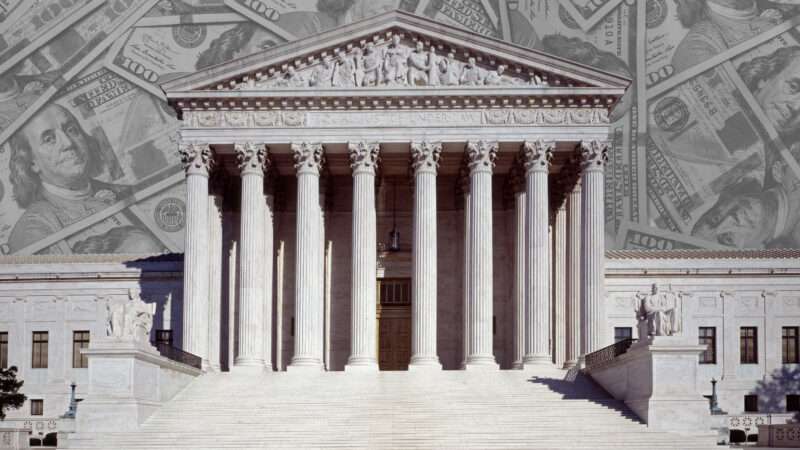

If media reports are accurate, President Biden will soon put forward a package of judicial reforms for Congress to enact. The Washington Post summarizes their likely content:
President Biden is finalizing plans to endorse major changes to the Supreme Court in the coming weeks, including proposals for legislation to establish term limits for the justices and an enforceable ethics code, according to two people briefed on the plans.
He is also weighing whether to call for a constitutional amendment to eliminate broad immunity for presidents and other constitutional officeholders, the people said, speaking on the condition of anonymity to discuss private deliberations.
On the policy merits, these are all actually good ideas, subject to the important caveat that there may be devils residing in the details. However, the term limits proposal cannot be enacted by ordinary legislation, but requires a constitutional amendment.
Term limits for Supreme Court justices (usually taking the form of 18-year terms) is an idea that enjoys widespread support from both experts and the general public. It brings together numerous legal scholars on different sides of the political spectrum, such as Sanford Levinson on the left, and Steve Calabresi on the right. Term limits attracted broader support than any other proposal considered by Biden's 2021 Commission on Supreme Court reform. A 2022 AP/NORC poll found that 67% of the public supports the idea, including 82% of Democrats and 57% of Republicans. I myself also support 18 year terms for justices, though I have warned this idea is unlikely to put an end to ideological and partisan conflict over the Court.
The problem with Biden's potential proposal is that he apparently wants Congress to enact the idea by statute, rather than through a constitutional amendment. Along with most other legal scholars, I think that's wrong as a matter of constitutional law. It would also set a dangerous precedent, if the president and Congress succeeded in getting it enacted, and courts did not strike it down as unconstutional. I explained why in a 2020 post:
If Congress can impose an 18 year term limit, they can also impose much shorter ones, such as a five year limit or a two year limit. That would make it easy for any party that controls both Congress and the White House to get rid of justices whose rulings they dislike, and replace them with more supportive jurists. And if Congress can impose term limits on all justices, they can also selectively impose them on specific justices it especially wants to get rid of, while leaving the others alone. For example, if a Democratic Congress wished to get rid of Gorsuch, Kavanaugh, or Amy Coney Barrett…, they could pass a law imposing very short terms on justices appointed in 2017, 2018, and 2020, respectively. Republicans could use similar tactics to target liberal justices who might otherwise become thorns in their side.
Some proposals put forward by Democrats would create a kind of rotation system, limiting the roles of longer-serving justices, rather than removing them from the Court entirely. These ideas have much the same constitutional flaws as more conventional statutory term limits. And they also pose a similar threat to judicial independence. Legally, the key point is that the Constitution provides for filling the "office" of a judge of the "supreme court." As Michael Ramsey pointed out in a critique of an earlier rotation proposal:
Necessarily, holding the "Office" of judge of the supreme Court means acting in a judicial capacity as a member of the supreme Court, not simply having the title and filling in occasionally. This constitutionally defined office can't be redefined by statute to mean the office of acting in a judicial capacity as a member of the supreme Court for a while and then doing something else for the balance of one's tenure. (Otherwise, Congress could define the "Office" of Supreme Court Justice as serving as a Justice for 5 years and then serving as dogcatcher in East Outback, Alaska, for the rest of the time)
Ultimately, if enacted, statutory term limits would likely be challenged in court, and the justices would probably rule against them.
Unlike in the case of term limits, Congress has broad (though not unlimited) power to enact ethics rules for the justices. Justice Alito was wrong to suggest the legislature has no authority to regulate the Court. As a policy matter, I think it would be desirable to limit the extent of gifts justices can receive from private parties, thereby banning the kinds of very large gifts that Justice Thomas, among others, has gotten. I think these kinds of gifts are already now forbidden by the Justices' voluntary ethics code, adopted last year. But there's no harm, and likely some benefit, in making such rules mandatory.
I have little sympathy for arguments that the justices need to be able to accept large gifts in order to supplement their supposedly inadequate salaries. Currently, the Chief Justice gets an annual salary of $312,200 and associate justices get $298,500. That seems more than enough to live very well, even in the admittedly expensive Washington, DC area (whose costs are familiar to me, because I live there myself).
Yes, I know that big law firm partners make much more than this. But the power and prestige of being a Supreme Court justice provide extremely valuable nonpecuniary income. Plus, justices don't have to work as many hours as most elite private sector lawyers, and they get to take much longer summer vacations, if they want to.
At the same time, there is no evidence that any modern justice ever changed a vote or opinion in exchange for gifts. So anyone who expects this kind of reform to lead to changes in the Court's jurisprudence is likely to be disappointed.
In addition to gift limits, an ethics code might also include recusal rules, and perhaps other provisions. I would have to see the details before passing any kind of judgment on them.
Finally, I am very much in favor of a constitutional amendment stripping presidents and other high officials of immunity from criminal prosecution for actions taken while in office. The Supreme Court's recent ruling in Trump v. United States goes too far in granting such immunity to the president, though the exact scope of what they have given him is often vague. On balance, I think the danger of giving presidents and other high officials impunity for criminal abuses of power is a far greater danger than the problem of excessive prosecution by partisan enemies. The latter, moreover, could be curtailed by giving the president statutory immunity for various petty charges (which I would hope any constitutional amendment would still allow the legislature to do).
Obviously, as with almost any meaningful amendment, the odds of enacting this one are extremely low. It seems to me highly unlikely that any immunity-constraining amendment could get the necessary two-thirds support in both houses of Congress, plus ratification by three-fourths the states.
A term limits amendment would have a better chance of passing, because of the broad bipartisan support for the idea, among both experts and the public. But it would still be an uphill struggle. Moreover, the drafters would need to find ways to address the issue of how to deal with current justices. Exempting them would likely anger the political left. Not doing so risks losing support on the right.
The President's motive for putting forward these ideas now is likely at least partly political. The Supreme Court has become highly unpopular. Currently, it only has an approval rating of about 36% in the 538 average of recent polls, with about 56% disapproving. Targeting the Court might be good politics, and could help bolster Biden's flagging campaign. Moreover, if reports about the proposals are correct, Biden has focused on ideas that are generally popular, such as term limits, while avoiding much less popular (and very dangerous) idea of court-packing.
As noted above, purely statutory term limits would set a dangerous precedent. But swing voters (most of whom don't follow policy issues closely, and know little about them), may not grasp that.
When and if Biden actually puts forward these proposals, we will learn more about how good or bad they are, and whether they have any political effect. Stay tuned!
UPDATE: I suppose I should make the relatively obvious point that any Supreme Court reform statutes are unlikely to pass before the November election, given that the GOP-controlled House probably would not put them up for a vote.
The post Biden to Propose Supreme Court Reforms appeared first on Reason.com.







